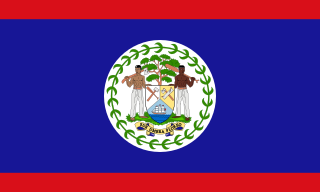
Elections in Belize are the duly held elections held at various levels of government in the nation of Belize.
Godfrey P. Smith is a Belizean jurist, attorney and politician. A member of the People's United Party (PUP), Smith is a former member of the Belize House of Representatives.

The House of Representatives of Belize is one of two chambers of the National Assembly, the other being the Senate. It was created under the 1981 constitution. Members are commonly called "Area Representatives."

The Senate is one of the chambers of the National Assembly of Belize. It has 13 members appointed for a five-year term by the Governor General of Belize.

A legislative election was held in Belize on 5 March 2003. Belizeans elected 29 members to the House of Representatives for a term of five years.

General elections were held in Belize on 27 August 1998. The result was a victory for the People's United Party, which won 26 of the 29 seats and Said Musa was elected as Prime Minister for the first time. Voter turnout was 90.1%, the highest since independence.

Belize municipal elections, 2006 were a series of local elections held on March 1, 2006, to fill vacancies for town councils in Corozal, Orange Walk, San Pedro, San Ignacio, Benque Viejo, Dangriga, Punta Gorda, Belize City and Belmopan. All the councils except Belize City elected one mayor and six councillors; Belize City elected one mayor and ten councillors.
The We the People Reform Movement is a Belizean political party established in 2003.

The Leader of the Opposition of Belize is an elected official who, according to the Constitution, "commands the support of those elected officials that do not support the Government." He or she speaks on behalf of the Opposition Members of Belize's House of Representatives.

A legislative election was held in the nation of Belize on February 7, 2008. Beginning with this election, Belizeans elected 31 members to the House of Representatives of Belize instead of 29. In what was considered an upset, the opposition United Democratic Party (UDP) won the election with 25 out of 31 seats; the ruling People's United Party won six.
Zenaida Victoria Moya is a former mayor of Belize City, Belize, first elected in elections held in March 2006. She is a former member of the United Democratic Party (UDP). Moya was Belize City's first female mayor.
Dean Russel Lindo was a Belizean attorney and politician. He was one of the principal founders of the United Democratic Party in 1973 and served as its first leader from 1974 to 1979.
The Kremandala Show is a Belizean political commentary talk show airing on Krem Radio and Krem Television. It premiered in 1994 on radio and 2005 on television and was hosted by KREM founder Evan X Hyde.
Francis William Fonseca is a Belizean politician who served as leader of the People's United Party (PUP) and as Leader of the Opposition of Belize from 2011 to 2016. First elected to the Belize House of Representatives from the Belize City-based Freetown constituency in 2003, Fonseca served as Attorney General and Minister of Education, Culture and Labour in Prime Minister Said Musa's cabinet until February 2008, when the PUP lost the general election to the opposition United Democratic Party (UDP). Fonseca was one of only six PUP representatives nationwide to retain his seat in the National Assembly in the 2008 election.

A legislative election was held in Belize on 7 March 2012 to elect all 31 members of the Belize House of Representatives as well as offices in the various local governments. The election was run by the Elections and Boundaries Commission's Elections and Boundaries Department. Dean Barrow and his United Democratic Party (UDP) were re-elected, but lost eight seats to the opposition People's United Party (PUP) to maintain a slim 17-14 majority in the Belize House. The upper house of the Belize National Assembly, the Senate, was appointed after the election by the UDP-led government in accordance with the Constitution of Belize.

General elections were held in Belize on 4 November 2015 to elect members of the House of Representatives. On 28 September 2015 Prime Minister Dean Barrow announced that he had advised the Governor-General to dissolve the National Assembly and to fix Wednesday 4 November 2015 as the date for the next general elections.

The next Belizean general election will elect members of the country's House of Representatives. It must be held on or before 13 February 2021.









